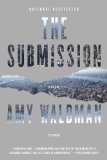Book Club Discussion Questions
In a book club? Subscribe to our Book Club Newsletter!
For supplemental discussion material see our Beyond the Book article, National 9/11 Memorial & Museum and our BookBrowse Review of The Submission.
Please be aware that this discussion guide will contain spoilers!
- What do you think the purpose and message of a national memorial should be? Would you have
voted for the Void or the Garden?
- Reread the epigraph. What do its words suggest about the relationship between nature and human
nature?
- As Claire tries to explain the tragedy to William (and, in a way, to Penelope), what does she
discover about her own beliefs and feelings?
- Mo is under considerable pressure to give the "right" reasons when asked why he entered the
competition, but he defies simplistic answers. What does his design communicate on its own? For
any creative work - including novels - should the author's biography matter to us? Do you think
he was obligated to explain himself and his design? Why or why not?
- Chapter 16 begins with a depiction of Mo's hunger and thirst during Ramadan. We're told, "The
truth was he didn't know why he was doing it." How does it affect him, a secular skeptic, to join
Muslims worldwide in observing the fast?
- How did your reactions shift as Sean's story unfolded, especially as he struggled with conflicting
feelings after pulling Zahira's scarf? Is bigotry excusable if it's coming from someone whose
loved one was the victim of a horrific crime? What are the limits of a survivor's rights?
- Asma's memories of Inam are her private inheritance, and she must rely on translators to convey
her messages in English. Did anyone in the novel have a truly accurate understanding of her
suffering? How was her mourning experience different from Claire's and Sean's? What common
emotions do all of the novel's survivors share?
- Many of the characters desperately want someone to blame for their loss. The final line of chapter
22, referring to Alyssa, reads, "She is responsible." Ultimately, who is responsible for the tragedies
depicted in the novel?
- What would you have done in Paul Rubin's situation? Was it courageous or insensitive of him to
permit Mo's submission to move forward?
- A journalist, Amy Waldman had special insight into Alyssa's world. What does the novel tell us
about the role of the media (exploited by all parties involved) and the impact of a free press in
the information age?
- How does Claire's sense of self change when Jack reappears in her life? Did Cal, despite his
wealth, cost her an important part of her identity?
- Discuss the novel's title. To what (and to whom) must the characters submit? Who are the novel's
most and least submissive characters?
- An uproar erupted in 2010 when Park51, a community center housing a mosque, was proposed
for construction two blocks from Ground Zero. What does this conflict - and the one described
in The Submission - suggest about how 9/11 might have transformed American society? (Note:
Amy Waldman began writing The Submission several years before Park51 was announced.)
- What makes fiction a powerful way to explore events that shaped our lives? What can a novel
achieve that journalism and testimonials can't?
- In the final "dialogue" between Claire and Mo, orchestrated by Molly and William, is anything
resolved? What does the closing image of a cairn show us about the heart of the novel, and the
role of future generations in resolving history?
Unless otherwise stated, this discussion guide is reprinted with the permission of Picador.
Any page references refer to a USA edition of the book, usually the trade paperback version, and may vary in other editions.
For supplemental discussion material see our Beyond the Book article, National 9/11 Memorial & Museum and our BookBrowse Review of The Submission.
